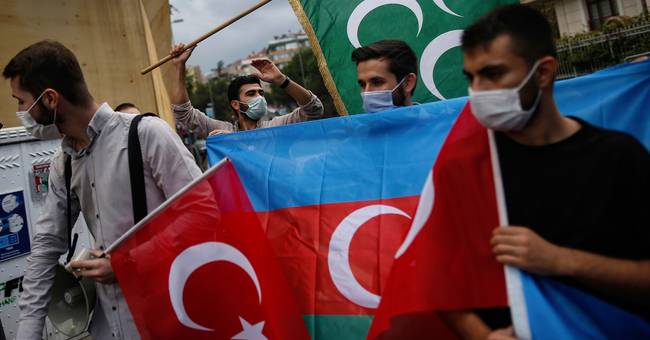The conflict between Azerbaijan and Armenia can probably be considered one of the world's most forgotten.
A low-intensity positional war with a frozen front line and a diplomatic stalemate.
From time to time minor fights flare up, which is met with newspaper notices at most.
But suddenly the stalemate has been loosened up with a violent force.
In the ongoing battles, there is a new dimension that can redraw the playing field in total.
Turkey's growing military ambitions could trigger a spiral of violence in which the horror scenario is a full-scale war of great power with Russia on the opposing side.
More threatening tone
Turkey's support for Azerbaijan is far from new.
The countries are very close to each other, which is usually expressed with the motto "one people, two states".
The issue particularly engages Turkish nationalists.
In Istanbul, honking caravans and the slogan "Karabakh is ours" have kept me awake for the past few nights.
Yet since the conflict erupted in connection with the collapse of the Soviet Union, Ankara's stance has been the same as that of President Erdogan now repeating: that Armenia must hand over the Nagorno-Karabakh breakaway region to Azerbaijan.
But the tone has taken on a whole new tone of threatening uncompromisingness.
As Turkey has in recent years engaged militarily in countries such as Syria, Iraq and Libya, Erdogan's rhetoric does not only serve as moral support for a brotherly people.
It is a clear signal that Ankara is ready to back up the word with full military force.
Bayraktar, a Turkish manufacturer of advanced combat drones, has shared videos on Twitter with bomb attacks on Armenian targets.
Turkey is also said to be recruiting Syrian mercenaries to fight on Azerbaijan's side.
The whole thing is denied by the Azerbaijani government, but is supported by credible testimonies to Reuters and the Guardian.
Opens the third front
Turkish drones and Syrian mercenaries are a well-proven recipe that turned the tide of war in Libya, where Ankara's military power is set against Russia's interests, just as in the Syrian war.
The fighting in the Caucasus means that Turkey opens a third front on the opposing side of Russia, which is closest to Armenia.
It is a bit contradictory that Turkey and Russia have been getting closer to each other in recent years.
But so far, armed conflicts have not prevented Erdogan and Putin from maintaining a good, if not loving, relationship, which can be seen as hopeful for a possible relaxation in the Caucasus.
Russia probably sees Turkey as a more manageable counterpart, preferable to the United States, which seems completely uninterested in getting involved in the conflict in the Caucasus.
For Erdogan and Turkey, this is not just a nationalist issue of the heart.
It is also an opportunity to tense military muscles.
The home audience gets something else to think about than the catastrophic economy.
The outside world is receiving an ominous display of Turkey's violent capital, a threatening signal to anyone who clashes with President Erdogan's interests in the region.

